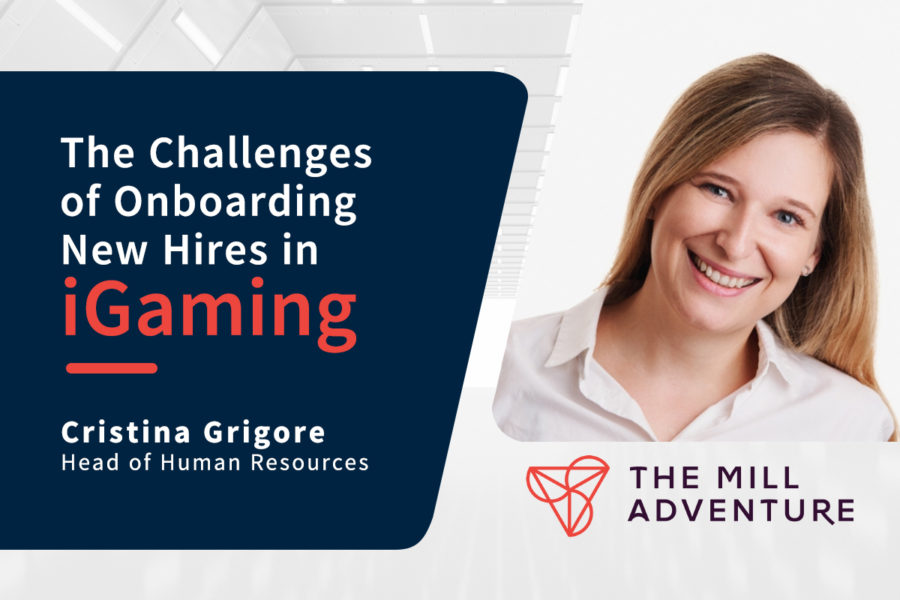The Mill Adventure: challenges of onboarding new hires in iGaming

Cristina Grigore, Head of Human Resources at the company, discusses on these challenges, their negative impacts and how to avoid them.
Press release.- The iGaming industry is expanding at a rapid rate, and with it comes a growing demand and competition for talent. Having an effective selection process is crucial, however, how a new employee is welcomed into the organization is a game-changer. Cristina Grigore, Head of Human Resources at The Mill Adventure, discusses the challenges of onboarding in iGaming companies, its negative impacts, and how to avoid them.
In the many years of serving fast-growing organisations, one of the patterns that I have observed when it comes to onboarding is that there is never enough time, bandwidth, or available skills to dedicate to proper inductions. There is a defence mechanism that start-up culture has developed to mask this problem — they declare from the very start that they are looking for “self-starting individuals, who can hit the ground running.” I’m sure you’ve heard or read this one before, right?
In reality, as opposed to more established organisations, which had the time and space to invest in culture refinement, start-up and scale-up cultures are even more abstract. The norms are not well established or uniform, so to achieve a successful onboarding, the first weeks of a new joiner are the right time to slow down and create the base that will later allow the individual to bring their Agame and contribute to the dynamic of the team and company.
By allowing the individual to settle in and learn the unspoken truths of the group and not assuming that the rules are implied, as well as speaking with candour about the strengths and shortcomings of the existing culture, a young company, through the voices of its team members, can create the ever-important psychological safety that any new joiner needs to provide a fresh perspective on how things can be improved and further developed.
If we narrow the outlook even further and consider the iGaming industry specifically, interesting insights can be found:
- The fast growth of many players in the market rarely caters to cultural enforcement.
- The high competition over talent creates a high attrition universe that makes the onboarding processes even more difficult.
- The post-pandemic reality is forcing many organisations into remote or hybrid models, where accountability for onboarding becomes more fluid.
Every organisation has its internal workings or norms — some of them are documented (i.e., values, principles, and non-negotiables), but the majority are group folklore, common knowledge for the established team members, and a complete mystery for new joiners. One of the reasons why many onboarding processes fail is that none of the parties involved in the process dedicates any time to introduce the nuances of culture to the new joiners. Because this important area is not tackled, the new joiner is left to play the guessing game in a constant state of uncertainty, which reduces the high motivation levels that normally come with exciting, new beginnings. The organisation is then left wondering “Why is the new joiner not absorbing our culture, although we already presented them with our values?”
Culture is always a sensitive topic, and getting it right takes time. However, when talking about getting the new joiner acquainted with the fine print of the team and company culture, there are a few important aspects to be considered:
- The existing members of the team should walk the talk because simply writing down a set of values and presenting them to the new joiner will not work.
- Those responsible for onboarding should be encouraged to share the unspoken norms. It will help the new joiner start on the right foot.
- Once the more discreet aspects of the culture are clear to the new joiner, it is important to use the feedback of the new joiners to iterate on your culture. A company’s culture and folklore should be living, breathing mechanisms, and the voices of new joiners can be catalysts for much-needed change.
Another pitfall found in many onboarding processes is that the existing team interacts with the new joiner based on the belief that expectations are apparent. According to Dr. David Rock, a renowned neuroscience specialist, one of the important factors that influence behaviour in social situations is the need for certainty. What can be more uncertain than joining a group of people one does not know in an unfamiliar culture and environment? If a new company expects a new joiner to naturally understand all the expectations from the latter, it can turn into quite an overwhelming scenario. To add even more complexity to that — different parts of the organisation will have different expectations. For this reason, during the onboarding period, constantly explaining expectations and (over) communicating them is critical.
So how can iGaming companies define a better onboarding strategy for new employees? At The Mill Adventure, we are consciously investing in culture building. Modesty, introspection, and continuous improvement are sacred to us, so when it comes to onboarding, we are trying to refine and adjust our approach with every new member who joins our team. We do this by:
- Spending time on shaping our onboarding process and allowing the team to actually implement it.
- Assuming nothing but positive intentions and encouraging the team to constantly express, define, and redefine expectations.
- Taking advantage of the fresh perspective of the new joiner, and instead of forcing them to start doing things “the way we always did them,” use every new start as a chance to have an introspective look at the team and company.











